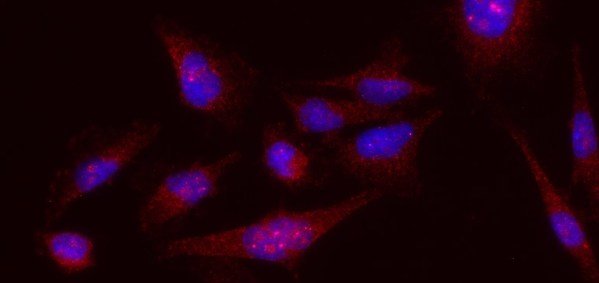Zantrene® kills melanoma cancer cells that overproduce FTO
30 September 2021 | Thursday | News

Melanoma cells stained with the BAK1 (red) and Dapi (blue).
- Zantrene® at low concentrations kills high FTO producing melanoma cancer cells
- Sensitivity to Zantrene® correlates with FTO levels, where high FTO producing cells show up to 60x greater sensitivity than low FTO producing cells
- Results are highly supportive of future clinical trials in melanoma using Zantrene® in combination with standard of care treatments
Race Oncology Limited ("Race") is pleased to share interim results from our collaborative preclinical melanoma research program with the University of Newcastle (ASX Announcement: 19 Mar 2021). Eminent melanoma researchers, Professor Xu Dong Zhang and Associate Professor Lei Jin, are leading the project.
This program is exploring the use of Zantrene® (bisantrene dihydrochloride) as a novel potential treatment for melanoma using cellular and mouse models. The aim is to identify drug combinations and melanoma subtypes that show improved treatment responses, with a focus on treatment-resistant melanomas.
These interim results showed Zantrene to be highly effective at killing a diverse range of high FTO producing melanoma cell subtypes. Data from the expression of the Fat Mass and Obesity-associated protein (FTO) showed an association between FTO expression level and sensitivity to Zantrene.
Zantrene has been identified as a potent targeted inhibitor of the Fat Mass and Obesity associated protein (FTO).[1] Previous studies have observed that FTO is over-produced in approximately 50% of metastatic melanomas[2] and that inhibition of FTO can overcome PD-1 immune checkpoint resistance in mouse melanoma models.[2,3] PD-1 immune checkpoint inhibitors have emerged as a front-line treatment for many types of cancer, including melanoma. While there have been major advances in melanoma treatments in recent decades, the five-year survival rate for advanced melanoma remains low.[4]
Race CSO Dr Daniel Tillett said: "These interim results are highly encouraging and support our clinical plans for Zantrene, with the correlation between FTO overexpression and sensitivity to Zantrene suggesting a strong anti-FTO therapeutic opportunity. The high sensitivity of many of the melanoma cell lines to Zantrene as a single agent at concentrations well below chemotherapeutic doses is unexpected and may offer new treatment options for melanoma patients."
Race CEO & MD Phillip Lynch said: "While challenged by COVID-19 related shutdowns we appreciate the encouraging and continued work from the team at the University of Newcastle. Zantrene continues to positively surprise us – we are very pleased with these early results. Melanoma remains a difficult cancer to treat, and one that's of particular relevance to the Australian community, so as we continue with this work, we look forward to learning more about our potential to offer new treatment options to patients."
Most Read
- The New AI Gold Rush: Western Pharma’s Billion-Dollar Bet on Chinese Biotech
- Top 25 Biotech & Biopharma Leaders in Sustainable Innovation, 2025
- China’s Biopharma Dealmaking Surges in H1 2025, Driven by Record Licensing and Oncology Focus
- Chikungunya in China: How a “Forgotten” Arbovirus Found the Perfect Storm
- How Innovation Gaps in Biopharma Raise New Safety Concerns
- Smart Implants and the Future of Musculoskeletal Injury Treatment
- How Ethical Gaps in Psychiatry Could Undermine Biopharma Progress
- The Evolving Landscape of Women’s Health Innovation in the Asia-Pacific
- Using NLP-Driven Decision Support in Emergency Health Assistance
- Taiwan Steps Into the Global Spotlight With a New Cancer Therapy
- The Role of Unique Device Identification (UDI) in Tracing Medical Device Safety
- The Importance of a Patient’s Mental Health During Clinical Trials
Bio Jobs
- The State of Biotech and Life Science Jobs in Asia Pacific – 2025
- Avantor’s New CEO Ligner Aims to Unlock Global Potential and Deliver Shareholder Value
- AstraZeneca Commits $50 Billion to U.S. Expansion by 2030 in Biggest-Ever Global Investment
- Thermo Fisher, SAMRC, and South Africa’s Department of Science and Innovation Launch CATIR to Nurture Next-Gen Scientists
- Cube Biotech Appoints Former Sartorius CEO Dr. Joachim Kreuzburg to Board of Directors
- FDA’s AI Transition Marks a Turning Point in Drug Review: Industry Faces Pressure to Adapt Amid 20% Workforce Cut
- WuXi XDC Completes Mechanical Build of Singapore Bioconjugate Manufacturing Hub
News
Editor Picks











